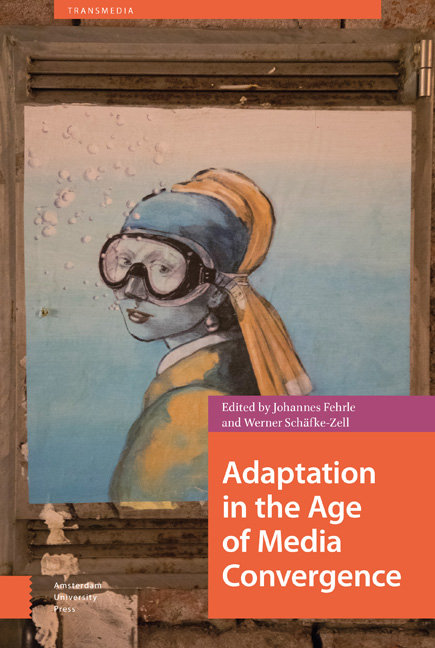Book contents
- Frontmatter
- Contents
- 1 Introduction: Adaptation in a Convergence Environment
- 2 Adaptation as Connection: A Network Theoretical Approach to Convergence, Participation, and Co-Production
- 3 Filing off the Serial Numbers: Fanfiction and its Adaptation to the Book Market
- 4 From Paratext to Polyprocess: The “Quirky” Mashup Novel
- 5 “You Just Got Covered”: YouTube Cover Song Videos as Examples of Para-Adaptation
- 6 Masters of the Universe? Viewers, the Media, and Sherlock's Lead Writers
- 7 Alien Adapted (Again and Again): Fictional Universes between Difference and Repetition
- 8 “Everything is Awesome:” Spreadability and The LEGO Movie
- 9 Localization as Adaptation in the Wolfenstein Franchise
- Index
2 - Adaptation as Connection: A Network Theoretical Approach to Convergence, Participation, and Co-Production
Published online by Cambridge University Press: 21 November 2020
- Frontmatter
- Contents
- 1 Introduction: Adaptation in a Convergence Environment
- 2 Adaptation as Connection: A Network Theoretical Approach to Convergence, Participation, and Co-Production
- 3 Filing off the Serial Numbers: Fanfiction and its Adaptation to the Book Market
- 4 From Paratext to Polyprocess: The “Quirky” Mashup Novel
- 5 “You Just Got Covered”: YouTube Cover Song Videos as Examples of Para-Adaptation
- 6 Masters of the Universe? Viewers, the Media, and Sherlock's Lead Writers
- 7 Alien Adapted (Again and Again): Fictional Universes between Difference and Repetition
- 8 “Everything is Awesome:” Spreadability and The LEGO Movie
- 9 Localization as Adaptation in the Wolfenstein Franchise
- Index
Summary
Abstract
Cultural production is increasingly understood along the lines of self-organizing network dynamics instead of as linear and more or less stable (translation) processes with clear-cut creator-recipient dualisms. Participation and remediation, however, have always been a constitutive factor in cultural production. I propose to treat adaptations as embedded in and shaping the complex, non-linear, and decentralized networks of culture that operate along the lines of shifting and contingent connections between human and non-human actors. In doing so, I will show why it can be helpful for critical adaptation studies to take seriously the notion of cultural “function.” Making productive insights into biological adaptation for cultural adaptation studies, I aim to shed light on the connotation of adaptation as temporary and contingent “knowledge.”
Key words: Network theory; cultural functions of adaptation; biological vs. cultural adaptation; adaptation as a form of contingent knowledge
Adaptation as processual knowledge
Contrary to some public discourse, adaptation studies is far from thinking of adaptations as “poor” derivatives of original source texts. The so-called “fidelity discourse” has been successfully deconstructed or, as Kamilla Elliott and Simone Murray suggest, has never played as big a role in adaptation studies as scholars have repeatedly claimed. While the tendency to make value judgments based on how “truthful” an adaptation is to its original persists in fan communities, adaptation studies have long deconstructed unidirectional and hierarchical models of adaptation practices. Furthermore, the field of adaptation studies has opened up to a variety of media and multidirectional adaptation processes beyond the field of novel-to-film adaptations. The theoretical reconceptualization of adaptation studies has been spurred on, among other things, by an increasing cultural development towards what Henry Jenkins calls “convergence culture,” coinciding with a scholarly interest in the participatory nature of popular culture and of a supposedly democratic “grassroots” creativity. In the Information Age, adaptation is no longer regarded as the exception but represents instead the rule as to how media products and stories emerge, proliferate, and interact with each other. Cultural production is increasingly understood along the lines of self-organizing network dynamics instead of as linear and more or less stable (translation) processes with clear-cut creator-recipient dualisms.
- Type
- Chapter
- Information
- Adaptation in the Age of Media Convergence , pp. 31 - 56Publisher: Amsterdam University PressPrint publication year: 2019

